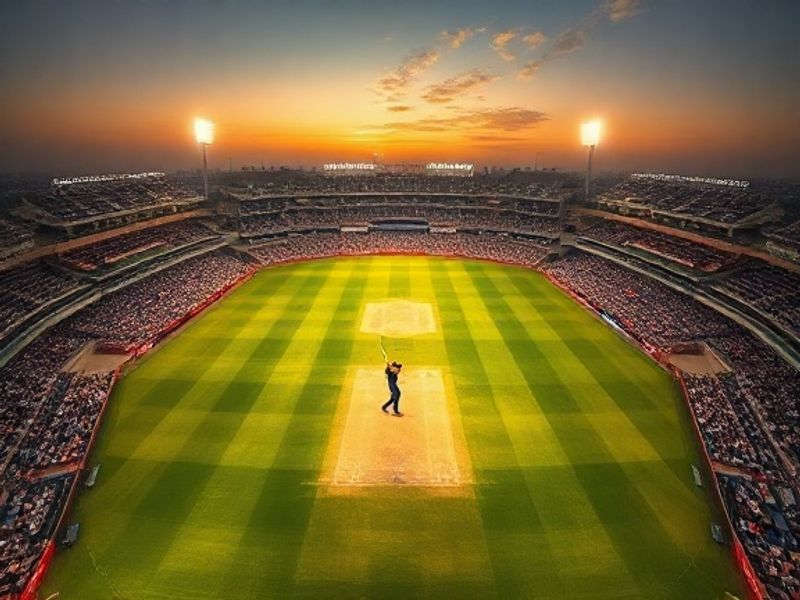India vs UAE: The Global Spectacle Where Cricket Outruns Climate Change (Barely)
The Last Super Over Before the Apocalypse: India vs UAE and the Global Theatre of Micro-Battles
By Our Man at the End of the World (Bar, Dubai Duty-Free)
Dubai, 5:47 p.m. local time. The sun is a cheap gold coin glinting off the Burj Khalifa’s windows, and 1.3 billion Indians plus everyone else with Wi-Fi are about to watch eleven men in blue chase eleven men in slightly lighter blue across a square of imported Australian grass. In geopolitical terms, this is India vs UAE. In cosmic terms, it’s two mammals swatting leather while the planet quietly files for Chapter 11.
The fixture, technically a warm-up for the T20 World Cup, is being marketed as an “intriguing contest.” Translation: the odds on India are shorter than a Russian oligarch’s yacht register, while the UAE—population 9.8 million, or roughly the number of Indians on a Mumbai commuter train—has been invited to the adults’ table for the night. Bookmakers give the Emiratis a 7% chance, which coincidentally matches the global approval rating of late-stage capitalism.
Yet the broadcast footprint is a marvel of soft power. Hotstar streams it in 17 languages, including Klingon for expats who’ve forgotten Gujarati. In Qatar, fans sneak peeks on their phones between World Cup stadium shifts. Somewhere in Silicon Valley, a machine-learning algorithm decides whether to recommend the match or footage of California wildfires; it chooses cricket because the burn rate is metaphorical, hence brand-safe.
On the field, the plot is almost too symmetrical. India’s openers are worth more in sponsorship rupees than the UAE’s entire GDP. The UAE captain, 34-year-old CP Rizwan, is a Kerala-born civil engineer who still clocks in at Abu Dhabi Municipality when not moonlighting as an international cricketer—a living metaphor for the gig economy. When he edges Jasprit Bumrah to slip, the replay is sponsored by a crypto exchange whose CEO is currently “on leave” in the Seychelles.
In the stands, the Indian tricolour outnumbers UAE red-green-black by a ratio usually reserved for UN General Assembly votes. Local Emiratis watch politely, the way one observes an aggressive peacock on the lawn. A stray cheer erupts when UAE off-spinner Karthik Meiyappan bowls a dot ball; it’s the same pitch of enthusiasm you hear when a budget airline announces complimentary water.
The broader significance, you ask? Consider the carbon footprint: each six that clears the ropes is roughly equivalent to three Delhi-to-Dubai flights in metric tons of CO₂. The fireworks that follow India’s 46-run win are visible from the International Space Station, where astronauts—citizens of the only tax haven left—record it for Instagram under #OneFamily. Back on Earth, a Pakistani fan tweets that the real contest was between India’s batting depth and UAE’s visa-on-arrival policy. The tweet is ratioed into oblivion by 14-year-olds with anime avatars.
Meanwhile, global supply chains hum along to the rhythm of the match. Mumbai’s stock exchange pauses its slide for three hours, proving that hope can indeed be monetised. In London, hedge funds arbitrage advertising slots during the innings break, because nothing says “future of finance” like betting on how many times Virat Kohli adjusts his gloves. And in Washington, a Congressional staffer files the encounter under “cultural diplomacy,” right next to the folder marked “things we’ll remember when the oceans reach Ohio.”
When the last wicket falls and fireworks bloom like toxic orchids, the stadium empties faster than a British pub at closing time. Outside, Nigerian TikTokers livestream themselves dancing beside a Bangladeshi food truck that’s run out of biryani but still has existential dread on the menu. The Indian team boards a bus powered by biodiesel made from yesterday’s samosa oil. The UAE squad heads home in two Toyota Corollas, because the minivan’s in for service.
So what did we learn from India vs UAE? That in the 21st century, even a mismatch can be a mirror: we cheer micro-victories while macro-defeats accumulate like unread emails. That nationalism is the most lucrative streaming platform yet invented. And that somewhere between the sixes and the strategic time-outs, we agreed—without ever saying it—that the world may be ending, but at least it has excellent Wi-Fi.
Game over. Queue the next catastrophe.







